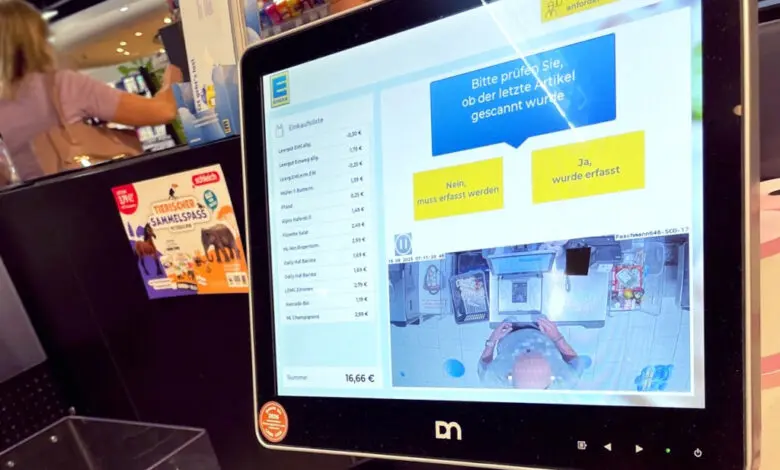Self-checkout challenges for retail employees: How AI can help
12th July 2023

The digital revolution and the fear of technology taking over
Henry Ford, when asked about the development of his Ford Model T whether customer input was considered, is famously quoted “if I had asked people what they wanted, they would have said faster horses”. Whilst humans have, since the dawn of time, found ever more efficient ways of getting things done, there is also reticence to change and a fear of technology taking over.
The fear of the impact of AI on jobs is growing, however SeeChange’s approach is to utilise AI to make employees lives easier, and to free them up for higher value tasks. For industries such as Retail, implementing AI solutions can make the roles more attractive for new recruits, and less stressful for existing employees by overcoming challenges employees face in customer facing roles. In terms of shear speed of change, the Digital revolution is like no other. Advancements arrive daily and push the boundaries in ever more challenging ways. Trying to keep up with all of these advancements is impossible. For many people these new applications of technology are so vast that even picking out the ones that could help them are challenging.
The hottest topic right now, of course, is AI and all the iterations of it. Solutions are rising so rapidly that it is anticipated Generative AI could raise global GDP by 7% (nearly $7 trillion) in the next 10 years. As AI solutions appear in every industry, touching every part of working lives in different ways – from banking automation to crop harvesting, cancer detection to logistics it is understandably creating a fear that more jobs may be replaced by automation. For some industries, this is happening more frequently. Goldman Sachs report that across the European Union and US 300 million jobs could be lost to automation. However, for other industries struggling to recruit adequate employee numbers, AI could help to close the gap. Retail is one such industry.
The responsibilities of the retail frontline
Recruitment is a constant challenge in retail with customer-facing roles playing a vital role in ensuring the smooth running of stores. The tasks store employees fulfil in order to keep the store running include:
- Customer service: Greeting customers, answering questions, and helping them find what they are looking for
Sales: Processing customer payments, handling returns - Inventory management: Stocking shelves, rotating inventory, and checking for damaged or expired products
- Merchandising: Displaying products according to planograms, ensuring visual appeal to encourage sales
- Cleaning and maintenance: Keeping the store clean and tidy, highlighting repairs to managers
- Loss prevention: Monitoring the store for suspicious activities
This list is not exhaustive, and retail employees have faced working under difficult circumstances, such as keeping stores open during the global pandemic, with an increasing amount of responsibility due to personnel shortages. As customers demand more from their retail experience in exchange for their loyalty, retailers face a balancing act to attract and retain talent, whilst also managing customer expectations.
The retail recruitment challenge
Retail vacancies cost stores customer experience, customer satisfaction, and of course, they impact the bottom line. If fewer staff are spread across more tasks, it is inevitable that tasks will be missed. For example stock rotation could be neglected over simply refilling shelf gaps, merchandising may be seen as a lower priority, or cleanliness and appearance may be neglected as employees work to respond to the immediate challenges. Of course, vacancies also have a detrimental effect on existing employees who may be asked to take on more responsibility, to work longer hours and to add to an ever-growing list of tasks.
With retail roles stubbornly hard to fill, retailers are facing customer service levels slipping and other meaningful tasks not being completed. Retailers can utilise AI technology to improve customer experience, and to reduce the stressful parts of existing employees roles. These vacancy numbers are seen and felt across the world. Retailers are under increasing pressure to improve their offering to employees in higher wages, better packages and structured career progression opportunities in a bid to attract new talent. The number of vacancies for the sector simply add to these pressures – there are 100,000 open vacancies in the UK alone. Retail already has some of the tightest margins, is facing rising shrink rates and finding new ways to address shortages and retain existing talent is another problem to solve.
The Challenges of Self-Checkouts for Retail Employees
The rise of self-checkouts enabled retailers to tackle some challenges such as staff shortages, by allowing customers to serve themselves. Whilst stores can process customers more quickly, leading to shorter queues and better customer experience, with any new technology, the self-checkout implementation has raised some of its own challenges which can contribute to the stress and responsibility retail employees feel.
Self-checkouts can cause customer frustration. For example, searching a catalogue of products for fresh produce typically adds between 5-15 seconds for every type of produce a customer has in their basket. This can lead to either customers avoiding the self-checkout or choosing the first similar type of produce resulting in inventory inaccuracies. For customers, the dreaded “unexpected item in the bagging area” causes exasperation and frustration, resulting in a customer waiting for a store attendant to get to them and intervene.
Store assistants can find themselves in the firing line of frustration, as customers express their displeasure at having to wait, at the system not responding as they would expect, or implications of theft and fraud. More difficult to quantify, however, is the stress that comes from employees responsible for an entire self-checkout area needing to be vigilant to theft and fraudulent activity, and to understand how to manage such interventions safely, without compromising customer service and whilst considering the impact on other customers in the vicinity. This frontline workforce face negative customer interactions every day, and this can lead to employees feeling stressed and overwhelmed.
Retaining retail talent with AI solutions
The challenge for retailers is to demonstrate to their employees that they appreciate them, that they hear their concerns and address them – whether that is morale boosting perks of the job, or additional training in conflict resolution. Talent retention is key to stemming the numbers of people leaving the retail workforce, or prevent valued team members from moving to an alternative retailer.
AI solutions for retail can help reduce retail employee stress, freeing them up to perform other crucial parts of their roles increasing their happiness and ability to perform their job well. AI implementation can additionally help retailers demonstrate their desire and intent to ease the stress their employees may have when they go to work. Solutions such as fresh produce recognition can tackle a number of challenges. From the customer and retailer perspective immediate benefits can be seen including:
- Customers no longer need to navigate extensive catalogues to find produce items
- Eliminates language barriers enabling tourists to use familiar technology when they may not know the word or spelling for the produce they are looking for
- Inventory accuracy is vastly improved as customers are no longer responsible for identifying specific products
Errors and interventions are reduced – customers are able to self-correct issues and move through the checkout process faster - With checkout moving faster, queue lengths are reduced offering more seamless and frictionless experience in store
Customer journey and experience are improved
However, crucially for retailers their employees will feel heard and responded to as the above benefits translate into lower stress levels. Employees will benefit from:
- Less hectic running between self-checkouts responding to errors and interventions
- A smoother process means reduced customer conflict and a happier experience in store
Whilst AI is on the rise across industries, in this case AI compliments rather than replaces employees, taking away some of the stressful interactions and smoothing out the process. It allows retailers to explain to their employees the steps they are taking to alleviate conflict and overwhelming workloads, and allows employees to focus on high impact tasks that can help the store to thrive. Importantly for retailers AI solutions can help them to retain vital talent, tackling the impact of a challenging recruitment landscape.


